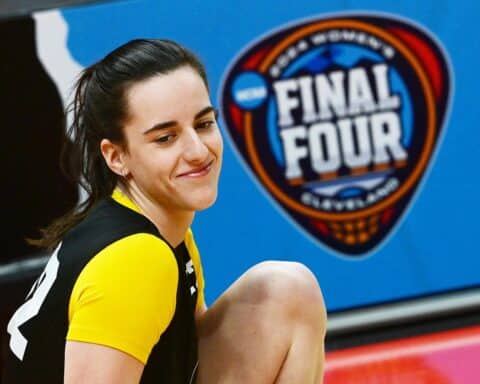God might not care about the outcome of a sports game, but he seems to enjoy seeing Catholic schools compete. In the 2018 March Madness tournament, Villanova and Notre Dame, both Catholic universities, won the men’s and women’s national basketball championships, respectively. Catholic high school programs in basketball and football are consistently ranked among the top 25 programs in the United States.
The benefits brought by athletic success, though, can become compromised if spiritual and academic formation become second-class concerns.
‘To support their brothers’
Chris Walter, a head soccer coach at Loyola High School in Los Angeles, California, told Our Sunday Visitor that by playing on a team together, students learn to pursue common goals and work together, and mature through dealing with success and losing. The team-oriented approach of sports, he said, is an important antidote to a society that increasingly places an emphasis on individual success and egotism. And for the whole school, it builds camaraderie.
| Positive Academic Footprint |
|---|
|
Studies have repeatedly shown a positive relation between athletics and academic success. Ohio high schools that encouraged athletic participation tended to have higher graduation rates and standardized testing scores. In Kansas, athletes had higher grades and graduation rates, compared to non-athletes.
|
“It brings students who are not athletes out to games, to support their brothers,” Walter said.
For former coaches like Dan Duddy, coaches at Catholic institutions are on the front line of helping their athletes succeed in both academics and faith. Now the pastoral minister for athletics at Donovan Catholic High School in New Jersey, and a board member of Catholic Athletes for Christ, Duddy told Our Sunday Visitor that “coaches are absolutely some of the most influential people in our high school kids’ lives.”
The emphasis on perfection learned in sports, he said, transfers well to both academic studies and living out faith. Students recognize that practice is the essential element for being an athlete or being religious.
But tensions between athletic and other responsibilities can occur because of the “demanding nature” of sports, explained Walter.
“It’s a significant commitment,” he said. Some teachers believe if their students gave up athletics they would do better academically. But academics were “part of the whole picture,” as a coach, Donovan Catholic’s Duddy said. Coaches know which player needs to study more, and said it was part of a coach’s responsibility to bring up academic improvement with athletes.
Distinctive schools
Greg Harcos, athletic director for Jesuit High School near Sacramento, California, told OSV that one of their challenges is that “coaches aren’t always aligned with its mission when they arrive.” So Jesuit High School runs preseason meetings with its coaches to discuss its Ignatian character, and to present the Jesuit mission of cura personalis, “care for the whole person.”
|
“Organized sport sometimes seems conditioned by the logic of profit, of the spectacular. It is also your task to proclaim and to witness to the humanizing power of the Gospel with regard to the practice of sport, which if lived in accordance with the Christian outlook, becomes a ‘generative principle’ of profound human relations and encourages the building of a more serene and supportive world.” — Pope St. John Paul II
|
“We’re not just worried about the X’s and O’s,” Harcos said. “There’s a lot more to the maturation process of our students, and spirituality is a large part of that.” The school makes sure they have “people in place that can actually help move along the spirituality and use sports as a vessel to do that.”
But schools need to have the staff in place to help coaches understand that mission, he said. “We have to have an idea and be deliberate in explaining that to the people who are going to represent us as an institution.”
Michael Murphy, director of Catholic Studies at Loyola University Chicago, told OSV that Sister Jean Schmidt, the iconic basketball chaplain who gained national fame during the 2018 March Madness tournament, is an example of what sets Catholic schools apart.
“Catholics to me have more freedom of speech than their secular counterparts: We’re able to talk about faith (and) theological realities,” Murphy said. Whatever the religious belief of students, he said, they enjoy the opportunity to be presented with spiritual discussions.
“When [Sister Jean] brings her spirituality to the basketball team,” he said, “she’s focused on the beauty and goodness of what God is doing in us, with us, and everybody responds.”
Problems
Athletic success comes with temptations that pull against the academic nature of a school. Duddy said that student athletes can be encouraged to minimize academics. Coaches can refuse to let a student stay after school for academic work, and long practices can leave little room to address difficulties in class.
On the other hand, he said, the “rising standards for acceptance into university” can provide pressure on students to maintain a holistic balance in their high school pursuits.
But the commercialization of sports also can introduce problems to successful schools. In 2017, college basketball brought in $950 million in revenue to the NCAA. NCAA Division I schools have been regularly investigated for academic fraud.
Loyola University’s Murphy said success could exacerbate “sibling rivalry” between athletics and academics at the university level, because of the resources that are devoted to sports programs. However even purist academics, he said, understand the university’s athletic success has raised the profile of the whole school.
His hope is that the success of Loyola basketball will provide an opportunity for the university to recommit to its academic heart and invest more in the humanities, “because that’s who we are.”
“Jesuit universities need to be more Jesuit, more Catholic — not more secular and more public,” he said. “If we use the student athlete success of Loyola to highlight the Sister Jeans of the world, and we don’t offer that on top as a programmatic university philosophy, we’re not really telling the truth.”
Murphy noted that students are “hungry for these questions.” He added, “I’m hoping that we as a culture return to our sanity about how important these things are to our sanity and health.”





